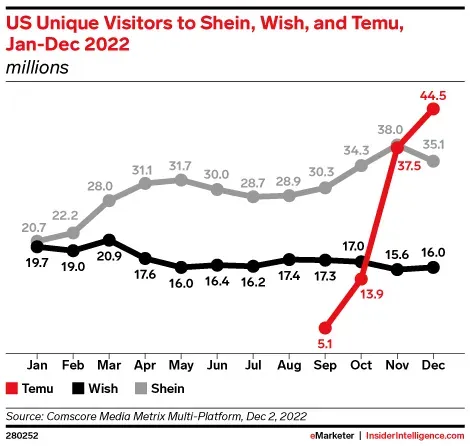Temu and Shein in Europe are rapidly adjusting their market strategies in response to the shifting economic landscape and growing regulatory pressures. As U.S. tariffs have led to a substantial drop in consumer spending for these China-based budget shopping giants, both companies are directing their attention toward the EU, where a notable increase in sales was reported in May. However, the transition is far from smooth; experts caution that EU e-commerce regulations will present similar challenges as those encountered in the U.S., particularly concerning fast fashion scrutiny and regulatory compliance. In this evolving landscape, Temu and Shein must navigate cross-border e-commerce challenges while maintaining their competitiveness amidst rising costs. With growing concerns about labor practices and product safety, it’s clear that their strategies need to be robust and adaptable to thrive in the European market.
The emergence of Temu and Shein within the European market signifies a notable shift in the dynamics of budget retailing from China. As these online shopping platforms pivot to enhance their presence in Europe, they face a maze of regulatory hurdles that could mirror the scrutiny they’ve encountered in the U.S. Navigating the complexities of fast fashion and compliance with EU consumer laws are critical for ensuring sustainable business growth. Additionally, the mounting focus on eco-friendly practices and responsible sourcing raises important questions about the future of low-cost cross-border shopping in this region. Consequently, Temu and Shein’s ability to innovate and adapt to the evolving regulatory landscape will be crucial for their long-term success in Europe.
The Changing Landscape of E-commerce: Temu and Shein in Europe
As Temu and Shein pivot their focus towards Europe, they are entering a significantly different e-commerce environment than what they experienced in the U.S. The decline in U.S. consumer spending, largely attributed to tariffs and rising costs, has prompted these Chinese budget shopping platforms to seek growth abroad. In fact, recent data shows a striking 63% increase in consumer spending on Temu and Shein in the EU, reflecting a robust demand for affordable fashion options. However, as they expand, they must navigate the complexities of local regulations and consumer behaviors that vary widely across European nations.
Despite the promising growth metrics, Temu and Shein must remain vigilant as they encounter regulatory scrutiny similar to that which they faced in the U.S. The European market comes with its own set of challenges, including compliance with stringent EU e-commerce regulations and faster scrutiny over labor and product safety standards. While the surge in sales offers a glimpse of opportunity, these companies will need to develop strategic frameworks to address these issues effectively while continuing to attract cost-conscious shoppers.
Navigating EU E-commerce Regulations: Challenges for Temu and Shein
The regulatory landscape for e-commerce in Europe poses significant hurdles for Temu and Shein. Proposed changes, such as the €2 customs fee, aim to curb the rampant growth of budget-friendly cross-border shopping, potentially slowing down Temu and Shein’s expansion efforts. This is particularly concerning since both companies capitalized on low-cost offerings to attract consumers amidst increasing prices in other markets. They will need to recalibrate their pricing models and operational strategies to maintain profitability while adhering to these new regulations.
Moreover, existing legislations, including France’s ‘anti-fast fashion’ bill, further complicate matters by targeting the environmental impact of fast fashion—a sector where both brands play fiercely. Compliance with these regulations is no small feat, as it requires robust protocols and transparency in their supply chains. Both companies might find themselves investing considerably in compliance measures to navigate the intricate web of EU policies that govern consumer protection, environmental standards, and labor practices, all of which are under heightened scrutiny.
Budget Shopping Trends: Embracing Challenges in Cross-Border E-commerce
Temu and Shein’s foray into Europe does not come without its share of cross-border e-commerce challenges. The shift is driven not just by declining consumer appetites in the U.S. but also by a rapidly evolving landscape where European consumers are becoming more selective about where they spend their money. As a result, these retailers must both enhance their product offerings and engage in effective marketing strategies that resonate with European audiences. This calls for not only cultural sensitivity but also an understanding of regional differences in consumer preferences.
Additionally, cross-border logistics and supply chain management represent another layer of complexity as Temu and Shein seek to deliver low-cost goods across various European countries. Challenges such as customs duties, shipping delays, and the unpredictability of foreign regulations could hinder their operations. To establish a successful foothold in this new market, these companies need to invest in logistics and technology that streamline their processes while ensuring timely delivery of products at competitive prices.
The Scrutiny of Fast Fashion: Consumer Sentiment Towards Temu and Shein
Fast fashion companies like Temu and Shein are currently under a critical lens, with consumers questioning the implications of their purchasing choices. The fast-paced nature of their business models often promotes excessive consumerism, leading to concerns about sustainability and ethical practices. As tensions rise over climate change and social responsibility, European consumers are increasingly inclined to support brands that not only offer low prices but also demonstrate environmental and social accountability.
This changing consumer sentiment has serious implications for how Temu and Shein market themselves. They will need to engage in transparency and socially responsible practices if they want to maintain their appeal to modern consumers. The complaints filed by BEUC against the two companies for allegedly encouraging overconsumption serve as a wake-up call, highlighting the urgent need for these businesses to adapt their strategies to align with evolving consumer expectations and values in Europe.
Adapting Marketing Strategies in the European Market
To successfully penetrate the European market, both Temu and Shein must rethink their marketing strategies and communicate effectively with local consumers. The data indicating rising sales suggests a favorable reception, but these platforms cannot rely solely on traditional advertising approaches. Embracing local trends, influencers, and platforms for outreach is critical in engaging audiences in countries like the UK and France, where e-commerce dynamics vary greatly.
In addition, their marketing campaigns must emphasize not just the affordability of their products but also their commitment to sustainable and ethical practices. By addressing issues like labor scrutiny and environmental implications, Temu and Shein can enhance their brand image while connecting with a demographic that increasingly values conscious consumption. Tailoring marketing content that resonates with European values could play a pivotal role in fostering brand loyalty as they continue to expand their presence in this thriving market.
Sustainability and Ethical Practices: Redefining Fast Fashion
As Temu and Shein navigate their operations in Europe, the importance of sustainability and ethical practices cannot be overstated. The increasing scrutiny of fast fashion has compelled both companies to evaluate how their business models align with the growing demand for sustainability among consumers and regulatory bodies. With the introduction of stricter laws aimed at mitigating the environmental impact of clothing production, it is crucial for these platforms to demonstrate a commitment to reducing waste and ensuring responsible sourcing.
By adopting more sustainable practices—such as offering eco-friendly product lines and implementing circular fashion initiatives—Temu and Shein can differentiate themselves from other fast-fashion retailers and appeal to environmentally-conscious consumers. Additionally, transparent communication regarding their labor practices and compliance with international standards will be vital in re-establishing trust and credibility within this critical market.
Addressing Labor Practices and Regulatory Compliance in Europe
The past controversies regarding labor practices have followed Temu and Shein into Europe, where compliance is expecting a higher standard. With increased awareness surrounding labor rights and the ethical sourcing of products, there is pressure for these companies to reassess their manufacturing processes. Regulatory bodies in Europe are closely examining labor conditions, particularly those stemming from countries known for questionable labor practices.
Establishing rigorous labor policies and adopting certifications that comply with European standards can significantly enhance the reputations of both brands. They will need to demonstrate a clear commitment to ethical labor practices through regular audits and public reports to assuage consumer concerns and mitigate potential regulatory repercussions.
The Future Outlook for Temu and Shein in Europe
While the current landscape poses numerous challenges for Temu and Shein within Europe, prospects for future growth remain compelling. With the rapid shifts in e-commerce dynamics, the key will not only be adaptability but a proactive approach to embracing change in consumer demands, regulation, and competitive pressures. As the companies recalibrate their strategies to meet European standards, they must also ensure operational transparency to win over a critical audience willing to engage with forward-thinking brands.
Market analysts remain optimistic, suggesting that the initial positive trends in sales indicate a healthy appetite for budget shopping solutions in Europe. By effectively addressing potential regulatory hurdles and aligning with local consumer values, Temu and Shein can position themselves as champions of responsible fashion retail, potentially achieving long-term success in a region that is increasingly influential on the global stage.
Frequently Asked Questions
What challenges do Temu and Shein face regarding EU e-commerce regulations?
Temu and Shein face significant challenges related to EU e-commerce regulations, especially concerning product safety and compliance with labor practices. As they transition focus from the U.S. to Europe, experts warn that they could encounter scrutiny similar to that experienced in the U.S., particularly with regulations such as France’s anti-fast fashion bill, aimed at penalizing environmentally harmful practices.
How are Temu and Shein adapting their strategies for the European market?
In response to declining sales in the U.S., Temu and Shein are redirecting their focus towards Europe, where they have increased advertising expenditures, particularly in the U.K. and France. Their strategy aims to capitalize on the significant year-over-year increase in EU consumer spending, but they must also navigate potential regulatory hurdles.
What impact does the proposed €2 customs fee have on Temu and Shein in Europe?
The proposed €2 customs fee is seen as a potential hindrance to the growth of low-cost cross-border e-commerce platforms such as Temu and Shein. This fee could raise the final cost of goods for consumers, making it more challenging for these companies to maintain their competitive pricing in the European market.
How significant is the increase in consumer spending on Temu and Shein in Europe?
Recent data indicates that Temu and Shein have experienced a remarkable 63% year-over-year increase in consumer spending in the EU and a 38% rise in the U.K. This positive trend is encouraging, suggesting strong demand for their budget shopping offerings, despite the regulatory and market challenges they face.
What accusations have been made against Temu and Shein regarding consumer practices?
Temu and Shein have faced accusations from the pan-European consumer organization BEUC for deceptive practices that encourage overconsumption. These complaints highlight regulatory concerns about the business models of both companies and their environmental impact, particularly under increasing scrutiny within the EU.
How are Temu and Shein responding to the scrutiny over their labor practices?
As Temu and Shein expand their operations in Europe, they must address concerns over compliance with labor practices, especially in light of alleged violations connected to U.S. regulations like the Uyghur Forced Labor Prevention Act. Both companies are likely to enhance their supply chain transparency and ensure adherence to local labor laws as part of their strategy.
What role does fast fashion scrutiny play in Temu and Shein’s European strategy?
Fast fashion scrutiny plays a critical role in shaping Temu and Shein’s European strategy. With legislative actions like France’s anti-fast fashion bill and increasing consumer awareness of environmental impacts, both companies must adapt their sourcing and marketing strategies to align with evolving consumer preferences and regulatory expectations.
Are Temu and Shein likely to succeed in the European market despite regulatory challenges?
Despite facing significant regulatory challenges, analysts remain optimistic about the growth potential for Temu and Shein in Europe. Their strong sales growth and strategic adaptations indicate that, with careful navigation of regulatory landscapes and alignment with consumer expectations, they may find success in this new market.
| Key Points |
|---|
| Temu and Shein are shifting focus to Europe due to declines in U.S. consumer spending impacted by tariffs. |
| Consumer spending in the EU rose by 63% year-over-year in May, while spending in the U.K. increased by 38%. |
| Despite growth in Europe, both companies will face increasing regulatory scrutiny similar to that in the U.S. |
| In May, consumer spending on Temu in the U.S. decreased by 36%, while Shein’s spending saw a 13% drop. |
| Regulatory challenges may arise from the EU’s proposed €2 customs fee and France’s ‘anti-fast fashion’ bill. |
| The BEUC has accused Temu and Shein of deceptive practices encouraging overconsumption, complicating their operations. |
| Overall, despite facing significant hurdles, the European market represents a substantial growth opportunity for both brands. |
Summary
Temu and Shein in Europe are navigating their business strategies in reaction to unfavorable trade policies impacting their U.S. operations. With increasing consumer demand in Europe, evidenced by substantial growth rates, both companies are investing in advertising while simultaneously preparing for regulatory challenges. Addressing new market dynamics and compliance with European laws will be crucial for their success as they aim to thrive amid scrutiny similar to what they faced in the U.S.



